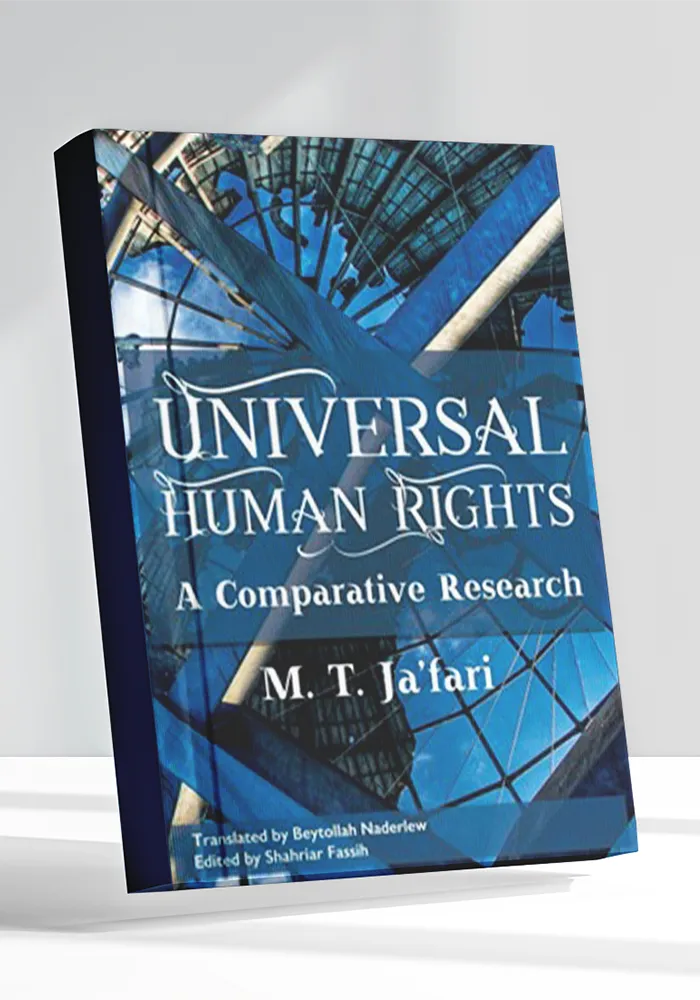Universal Human Rights: A Comparative Research
Universal Human Rights: A Comparative Research
by Allamah Muhammad Taqi Ja’fari
Bibliographic information
- Title: Universal Human Rights: A Comparative Research
- Author: Allamah Muḥammad Taqī Jaʻfarī
- Translated by: Beytollah Naderlew
- Edited by: Shahriar Fassih
- Publisher: Review Tales Editing & Publishing Services (27 Jan. 2017)
- ISBN: 198868000X
- Length: 268 pages
About the author:
Muhammad Taghi Ja’fari (born 1923, Iran, and died 1998) was a contemporary sage and an expert in philosophy and Islamic knowledge. Ja’fari was familiar with Western culture and also with the needs of modern human being and the contemporary culture. He was indeed an original and innovative thinker. One of the most important innovations of this honourable master was that he, like Allameh Tabatabaei and Sayyed Muhammad Bagher Sadr, used the methodology of comparative studies for introducing Islamic knowledge to a generation who was thirsty for truth. Indeed, Ja’fari has left us a collection of invaluable works on Islamic teachings, philosophy of arts, aesthetics, literature, mysticism, the study of the Nahjulbalaghah, psychology, human rights and pedagogy. In addition to being an expert in philosophy, in Islamic mysticism and in Fiqh (jurisprudence), Ja’fari was familiar with the works and the ideas of classical Western philosophers such as Socrates, Plato, and Aristotle. He was also versed in the works of modern philosophers including Descartes, Leibniz, Hume, Kant, Hegel, and contemporary philosophers such as Balzac, Dostoevsky, Tolstoy, Hugo, and modern-day physicists including Max Planck, and Einstein.
About the book:
Generally speaking, no other single issue within both Western and Islamic declarations of human rights is more vital than this very issue of inherent human dignity. Accordingly, the universal authorities on human rights needs to form a highly educated and spiritually illuminated team of scholars from all corners of the world comprised of anthropologists, psychologists – of course, not professional behavioural scientists – legal and moral scientists, religious authorities who believe in a holy scripture revealed by One God and equip them with all needed facilities so that they codify a true ( and intelligible) declaration of human rights upon the basic rights of the right to life, the right to education, the right to committed freedom and the right to equality according to their enlightened reason and conscience.
The truth is that if the inherent dignity of humanity is not demonstrated through clear reasons, the ruining formula of “I am the end and the others are merely my means” shall so continue to trigger bloody conflicts between human beings.
The formula that “all human beings are members of the same family and no one in this large family is better than the other as equal humans,” is only acceptable in the divine logic of holy prophets, and of course not in the aggressive logic of hunters of pleasure and selfish hedonists. The universal authorities on human rights urgently need to secure man’s connection with his creator and the realm of intelligibility if they are to implement fundamental human rights. It is for sure that today no religious conflicts would prevent humanity from touching his basic rights, as the needed ground has already been laid by cultural and philosophical discourses for mutual understanding on religion. Is it not possible now for us as humans to live peacefully with each other under the religion of father Abraham?
editor's pick
news via inbox
Subscribe to the newsletter.




